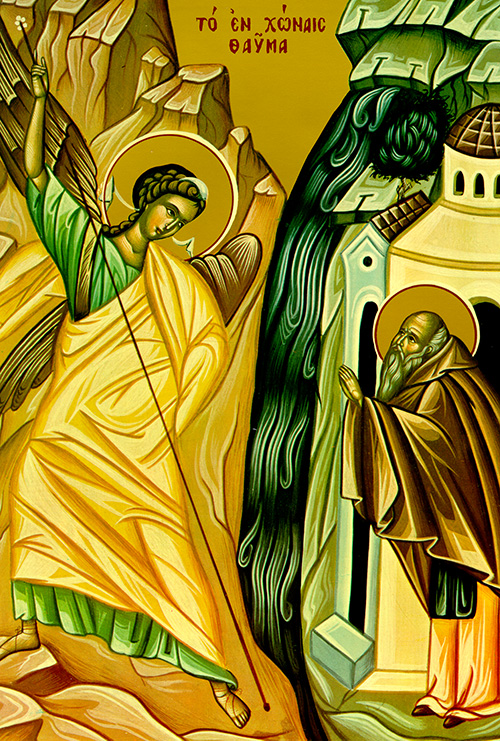

The commemoration of the miracle of the Holy Archangel Michael at Colossae in Chionia: the archangel Michael worked a miracle of conversion and healing in Colossae, as well as a miracle of preservation of the site from flood. It is remembered each year on this date.
The holy martyr Eudoxius and his companions Carterius, Styriacus, Tobias, Agapius and companions at Sebaste in Armenia. Under Licinius the emperor they are said to have been soldiers who persisted in the faith of Christ and who were cast into the flames in the early 4th century.
Leaders of the heavenly armies, although we are unworthy, we always beseech you to fortify us through your prayers and to shelter us beneath the wings of your sublime glory. Watch over us who bow to you and cry out fervently: Deliver us from danger, for you are the commanders of the powers on high.
Your martyr, Eudoxius, O Lord our God, in his struggle, received an incorruptible crown from you. With your strength, he brought down the tyrants and broke the cowardly valor of demons. Through his prayers, O Christ our God, save our souls.
Leaders of God’s armies and ministers of divine glory, commanders of angels and guides of mortals, plead on our behalf for what we need and for great mercy; since you are the leaders of heavenly hosts.
You gathered wealth in heaven and showered it upon the earth. You gave bread to the hungry and received a glorious crown. You are resplendent in your confession of Christ. You were brave and died at the hands of the law; thus you have earned the wages of your work. O long-suffering Eudoxius, beg Christ to forgive our sins.
Galatians 3: 15-22
Brothers and sisters, let me give you an everyday example of a promise not being nullified by the law. You cannot add anything to a man’s will or set it aside once it is legally validated. There were promises spoken to Abraham and to his “descendants.” Scripture does not say, “and to your descendants,” as if it applied to many, but as if it applied only to one, [as Scripture says], “and to your descendant”; that is, to Christ. My point is this: a covenant formally ratified by God is not set aside as invalid by any law that came into being four hundred and thirty years later, nor is its promise nullified. Clearly, if one’s inheritance comes through the law, it is no longer conferred in virtue of the promise. Yet it was by way of promise that God granted Abraham his privilege.
What is the relevance of the law, in such case? It was given in view of transgressions and promulgated by angels, at the hands of a mediator; it was to be valid only until that descendant or offspring came to whom the promise has been given. Now there can be no mediator when only one person is involved; and God is one. Does this mean that the law is opposed to the promises [of God]? Again, unthinkable! If the law that was given was such that it could impart life, then justice would be a consequence of the law. In fact, however, Scripture has locked all things in under the constraint of sin. Why? So that the promise might be fulfilled in those who believe, in consequence of faith in Jesus Christ.
Mark 6: 7-13
At that time Jesus summoned the Twelve and began to send them out two by two, giving them authority over unclean spirits. He instructed them to take nothing on the journey but a walking stick–no food, not a coin in the purses in their belts. They were, however, to wear sandals. “Do not bring a second tunic,” he said, and added: “Whatever house you find yourself in, stay there until you leave the locality. If any place will not receive you or hear you, shake its dust from your feet in testimony against them as you leave.” With that they went off, preaching the need of repentance. They expelled many demons, anointed the sick with oil, and worked many cures.
Icon courtesy of Jack Figel, Eastern Christian Publications – ecpubs.com
Tuesday, September 5 –